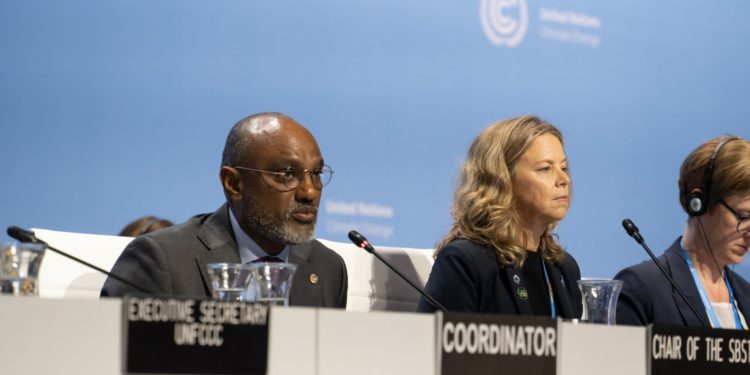During closing negotiations at the Conference of the Parties (COP30) to the United Nations Framework Convention on Climate Change (UNFCCC), the COP30 presidency acknowledged the significant progress made over ten days of meetings in Bonn, Germany. At a press conference on Wednesday evening, Brasil’s chief negotiator, Ambassador Liliam Chagas, and COP30 CEO Ms. Ana Toni presented an optimistic outlook on the proceedings.
Ms. Chagas noted that nearly all agenda items saw progress—an uncommon achievement in multilateral processes. Of the 49 items up for deliberation, only two ended without consensus. “We reached agreements on nearly all items in Bonn, including the global goal on adaptation, just transition, and the dialogue on the Global Stocktake (GST), among other key areas,” she said.
Ambassador Chagas mentioned progress on the work program for just transition and the ongoing Global Stocktake (GST) dialogues among the agenda’s highlights. “Despite the recent global political tensions, the climate regime worked in Bonn,” she pointed out. Ms. Toni added, “We had a collaborative environment and a collective willingness to move forward. This showcases the strength of climate multilateralism.”
Of the 49 items on the agenda for deliberation by the parties, only two were not agreed upon
Of the 49 items on the agenda for deliberation by the parties, only two were not agreed upon
Reflecting on the progress in Bonn, Ms. Toni emphasized the release of the COP30 Presidency’s fourth official letter, issued Friday, June 20, which presented the COP30 Action Agenda. In a groundbreaking move, the COP30 Presidency made public a framework focused entirely on accelerating the implementation of the GST. “The proposal was well received by governments, companies, civil society, and Indigenous peoples,” she said. “The call to accelerate resonated. Everyone wants to move forward.”
The COP30 CEO also noted that the Bonn sessions clarified key logistical issues for the upcoming conference in Belém, including safety, healthcare, and transport. However, accommodation remains a challenge, particularly in terms of pricing. Ms. Toni reiterated the Brazilian government’s commitment to finding solutions. “Belém is an emblematic city in the heart of the Amazônia, and we are ready to address any concerns,” she affirmed.
Finance was also a central focus. Ms. Toni highlighted discussions around the USD 1.3 trillion in global financial flows, which featured in two parallel sessions with dozens of contributions from countries and non-state actors. “While not formally part of the negotiations, this will be a key issue at COP30,” she said.
After 10 days of intense work, the prevailing sentiment at the COP30 Presidency press conference was one of confidence. “We came to Bonn asking for delivery, and we’re leaving with concrete progress,” Ms. Chagas concluded. “Now, we’re ready to move even further in Belém.”




















